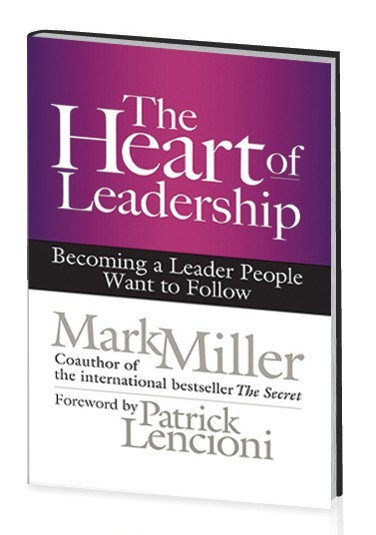I’ve been following Mark Miller on twitter for the past several months. I ran across his Twitter feed as a result of some other Chick-fil-A leaders that I follow. I also follow his blog and appreciate his insightful and practical tips on servant leadership. I was really excited when I heard that he was writing a new book and eagerly anticipated the release of The Heart of Leadership which finally dropped this week. Miller made several copies of his book available for free to bloggers willing to review his work. I jumped at the chance. The book arrived yesterday and I read it today.
The Heart of Leadership is a fable about a young man that is fed up with being stuck in his job and being frustrated at home. He is very intentional about getting help and is pointed towards several mentors who offer him their thoughts on leadership. Through his conversations, the reader is led on a journey to pick up tools for building their leadership character. This book is a quick and easy read, but you will walk away with some very practical resources that are not too difficult to put into practice…if you are willing to commit to being intentional about developing your leadership character.
I highlighted several things while reading and have pasted them below. Be sure to pick up a copy of The Heart of Leadership for yourself. Pick up some extra copies to give away to that young leader you know that is always asking you for advice.
- There is a lot more to leadership than great individual work.
- You can lead, with or without, a title. If you wait until you get a title, you could wait forever.
- If you don’t demonstrate leadership character, your skills and your results will be discounted, if not dismissed.
- Your ultimate success will not be determined by your level of skills. Leaders rarely fail because of lack of skills. They’re too easy to learn. It’s a leadership character that trips up a lot of leaders.
- Think others first.
- “Servant leadership is an approach contrary to conventional leadership in which the leader’s focus is on himself and what he can accomplish and achieve. Rather, the focus is on those being served. Servant leaders do many of the same things other leaders do—cast vision, build teams, allocate resources, and so on. The big difference is their orientation and their motivation; these make all the difference in the world. They possess an others-first mindset. The servant leader constantly works to help others win.”
- The servant leader constantly works to help others win.
- To think others first is not primarily about what you do—it is about how you think.
- If your heart doesn’t change, leadership character will always be a struggle for you.
- SERVE
See the Future
Engage and Develop Others
Reinvent Continuously
Value Results and Relationships
Embody the Values - Without leadership character, no one cares about your skills.
- Don’t confuse opportunity with leadership. Others control many of our opportunities, so that shouldn’t be our concern. We control our readiness.
- Expect the best.
- “To expect the best is an attitude, a belief, a choice, a lifestyle and a trait that virtually every successful leader possesses. We believe the best about others and about ourselves.”
- “Leaders are dealers in hope.” Napoleon
- The future has not yet been written—it is written by leaders.
- How can I serve this person? What does a win look like for him or her?
- Respond with courage.
- Courage is a response. When faced with a challenging or difficult situation, the best leaders most often respond with courage; less mature leaders, or nonreaders often choose another path—a path with less risk, less conflict, and less personal discomfort.
- Leaders usually don’t wait—they initiate.
- Leaders respond with courage when they:
Articulate the vision for the future.
Build relationships with challenging people.
Challenge people to grow and change.
Mend broken relationships.
Confront difficult problems.
Make hard or unpopular decisions. - Your missed opportunities are often no big deal in isolation. They are, however, cumulative.
- If there were no challenge, there would be no need for courage—or leadership. It’s one of the hardest parts of the job.
- Leadership character, like other character traits, once established, is hard to hide.
- Hunger for wisdom.
- Focus on the pursuit not the outcome.
- You need to think of your quest for wisdom as a hunger that will never be satiated.
- Leadership is a privilege, but it is not free—it comes at a price.
- Leaders accept responsibility.
- The best leaders don’t blame others. They own their actions and their outcomes.
- If you and I as leaders pretend we own the outcomes, it will: Change our level of engagement, Increase our level of buy-in, and Change the way we see people and the work.
- I get to decide. I choose my response. No one does that for me.
- Hunger for Wisdom
Expect the Best
Accept Responsibility
Respond with Courage
Think Others First - The heart of leadership is a matter of the heart.
- You and I have to answer the question of motive. Are we a serving leader or a self-serving leader?
Disclosure of Material Connection: I received this book free from the publisher through their book review bloggers program. I was not required to write a positive review. The opinions I have expressed are my own. I am disclosing this in accordance with the Federal Trade Commission’s 16 CFR, Part 255 <http://www.access.gpo.gov/nara/cfr/waisidx_03/16cfr255_03.html> : “Guides Concerning the Use of Endorsements and Testimonials in Advertising.”
